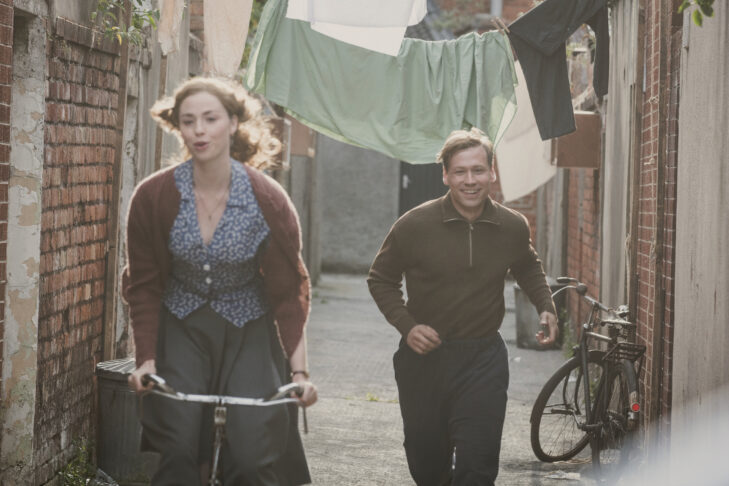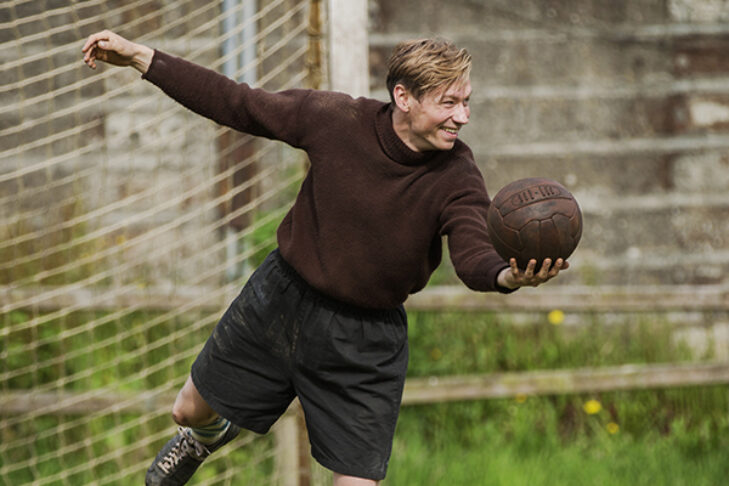We all need a good movie these days, right? “The Keeper,” directed by German filmmaker Marcus H. Rosenmüller, debuted on Saturday. It’s the true story of Bert Trautmann (David Kross), a German soldier, member of the Hitler Youth and World War II prisoner of war who—against a backdrop of British post-war protest and prejudice—becomes goalkeeper for Manchester City. Suddenly, he became a footballing icon.
Just one problem: His signing infuriates thousands of fans, many of them Jewish. But Trautmann receives unexpected support from Rabbi Alexander Altmann, who fled the Nazis and believes that people should be judged individually. Bert’s love for Margaret (Freya Mavor), an English woman, buoys him. He softens his opponents by winning the 1956 FA Cup Final, actually playing with a broken neck to secure victory.
I talked to Rosenmüller about the film.
Why do you think this film will be so compelling for viewers?
The former enemy, Bert Trautmann, was a Nazi in the Second World War. He became a great footballer and managed to conquer not only the heart of a British woman but also the heart of all the fans in England. It’s a big sports film, and there is a big love story inside and it has a political relevance. It’s a film about reconciliation, I would say.
What are the parallels between modern life and the film?
I think we perhaps understand how merciful democracy is. We have to meet people, and then we can judge people, and not because of some prejudices. I think the story makes clear how important an open-minded society is.
Why did you make this film?
I’m a really big soccer fan! And when I heard that there was a German in England who broke his neck and played on, and a rabbi, Alexander Altmann, helped him, and the people tried to accept him? And then the story with Margaret? There were all these ingredients that a good film should have. And they are all real! They really happened. I was just wondering why this film wasn’t already made.
I heard there were several tries, but it was not so easy in the ‘70s and ‘80s to create all these stadium scenes, all these football scenes, historical football scenes. I had the luck that nowadays it’s a little bit easier to create this set, but the plot points and the big pictures were already there. It was a present for me.
How does filmmaking connect you to a social mission?
Well, I always have a social mission in each of my films. This is also kind of my background; I’m a little bit political also. I fight for democracy. We should be open-minded, and I like to make people laugh and see the good parts of life; also, I do not ignore the bad ones. When people leave a film of mine, I hope they have more hope than they had before. I’m not stupid; I see that many things in life are tragic, but in my films, I try to give them a hope and a utopia that together we can manage, and I sometimes have the feeling that this is the way I can bring in my side of life and help others to find hope again.
Tell me about some of the challenges in telling a true story like this.
So, I met Trautmann. I had interviews with him over one week, I read all the books you can read about him, I saw documentaries wherever I could get some. But also I went to Manchester; you can see the books at Manchester City, and there’s a sports museum at Manchester. I met people who knew him. I interviewed other people who were in the POW camps in England. In the north of England, there’s a POW museum, where I got many inspirations.
How do you want audiences to feel when they finish the film?
You have to cry and laugh in several scenes with all my actors. One main theme is the letter of Rabbi Alexander Altmann in the film; I loved his letter, that we should not judge because of our prejudices toward some groups. Each person has to show as an individual what his doings [are], his attitude, and then we can judge. We have the responsibility to make our own view of the world.
“The Keeper” is being shown virtually through Coolidge Corner Theatre and elsewhere. Learn more here.













